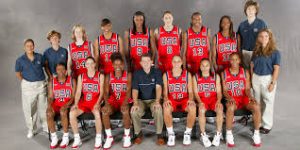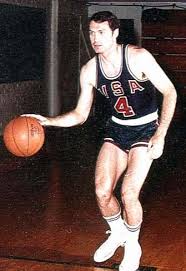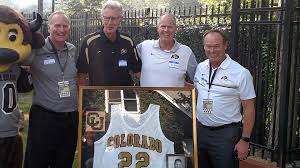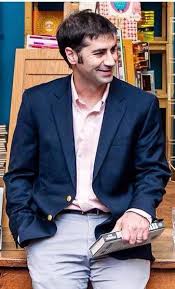The NBA Finals date back to 1947 (when they were known as the Basketball Association of America Finals) and the very 1st NCAA tourney was held in 1939. Olympic basketball competition is even older: it debuted as a demonstration event in 1904 and the men’s version became a medal sport in 1936, with the women finally getting their chance to go for the gold in 1976. The United States has dominated Olympic basketball competition from the start: the men have won 15 gold medals in the 18 tournaments they have participated in during the past 84 years, while the women have won 8 gold medals in the 10 tournaments in which they have competed during the past 44 years. Those of you who were looking forward to the 2020 Olympics opening ceremonies in Tokyo on July 24, 2020 will have to wait an extra 364 days, as the coronavirus caused a postponement until July 23, 2021. Due to the absence of college basketball since mid-March, HoopsHD’s Jon Teitel decided to fill the void by trying to interview as many prior Olympic players/coaches as possible so that you have something to read this summer while not watching the Summer Games. We continue our coverage by chatting with Ruth Riley Hunter about winning an NCAA title in 2001, a WNBA title in 2003, and a gold medal in 2004. Today marks the 16th anniversary of Ruth getting a rebound in team USA’s 74-63 win over Australia to clinch a gold medal. It is also a double-medal day as the men’s team beat Lithuania 104-96 to clinch a bronze medal in 2004.
You played for Hall of Fame coach Muffet McGraw at Notre Dame: what makes her such a great coach, and what was the most important thing that you ever learned from her? This 1 will be a long answer! She is 1 of the most influential figures in my life. Her knowledge of the game and ability to communicate it while empowering her players is great. She thinks through the Xs and Os so well: it is really remarkable. She is ultra-competitive, which has sustained her success over time. It is difficult to pick just 1 thing but she taught me to be confident in who I am both on and off the court.
In the 2001 NCAA tourney title game you had 28 PTS/13 REB/7 BLK and made the game-winning FTs with 5.8 seconds left in a 2-PT win over your in-state rival Purdue en route to being named tourney MOP: did you think that you were going to make both FTs, and what did it mean to you to win a title? In the moment you are not contemplating whether you will make them: I was just trying to be locked in and present in the moment while following my established routine. There is something really magical about finishing your career on top and walking off the court after winning it all. We spent 4 years trying to reach that point and to finish it that way was a storybook ending.
You were the 2001 national POY, a 2-time 1st-team All-American, and a 3-time Big East DPOY: how did you balance your offense with your defense? We played a lot of 2-3 zone! I have always been a defensive-minded player: there is something within me that always drives me to make a stand and keep my opponent from their goal of scoring. My offense came along much later in my career: I spent a tremendous amount of time working on those skills so that I could become multidimensional.
You were also a 2-time 1st-team Academic All-American, the 2001 D-1 Academic All-American of the Year, and in 2012 you were inducted into the CoSIDA Academic All-American Hall of Fame: how did you balance your work on the court with your work in the classroom? That is just how my mom raised me: it was always academics 1st for me and my siblings. As competitive as I am on the court, I took that into the classroom as well and wanted to be the best that I could be. The school offered me a lot of great resources and I love to learn, which is why I later returned to get my MBA.
You graduated with several school career records including 1007 REB/370 BLK/63.2 FG%: what is the secret to being a successful center? I was fortunate to play a lot of games starting as a freshman, which the career stats play into. It also gave me the experience to become better. Post play has started to become extinct but back then everyone had a shot-blocker anchoring their defense.
In the decisive Game 3 of the 2003 WNBA Finals with Detroit you scored a career-high 27 PTS/11-19 FG in a 5-PT win over Los Angeles en route to being named 2003 Finals MVP: how did you overcome an 11-PT 2nd half deficit against the 2-time-defending champions to become the 1st team in American pro sports to go from having the worst record in the league to a title the following season? Just belief. I give our coach a lot of credit. We were a young team who had a lot of talent and were very selfless. We really exceeded expectations the entire year: it was truly remarkable to add so many good pieces to an existing team. We executed down the stretch in the 2nd half.
In the 2004 Olympic gold medal game you had 1 REB for team USA in a win over Australia: what did it mean to you to represent your country, and what did it mean to win a gold medal? It was the greatest honor that I have ever had: it was my dream as a young girl because the WNBA did not exist. To compete on behalf of your country is so meaningful and to be the best in the world was 1 of the best moments of my career.
In 2019 you were inducted into the Women’s Basketball Hall of Fame: where does that rank among the highlights of your career? It was such a tremendous honor and a reflection upon all the steps of my career. To see all of the history and the fight for women to be allowed to compete is something that I did not expect.
Your husband Benjamin played football at Notre Dame: who is the best athlete in the family? I will go with me because I have fewer injuries! He also played baseball growing up so it is fun to have sports in common.
You currently work for the Miami Heat as a studio and radio analyst: how do you like the job? I love the fact that I get to remain around the sport in a different capacity. I was drafted by Miami and have tremendous respect for the Heat culture/organization. I love covering the team and being able to stay connected.













